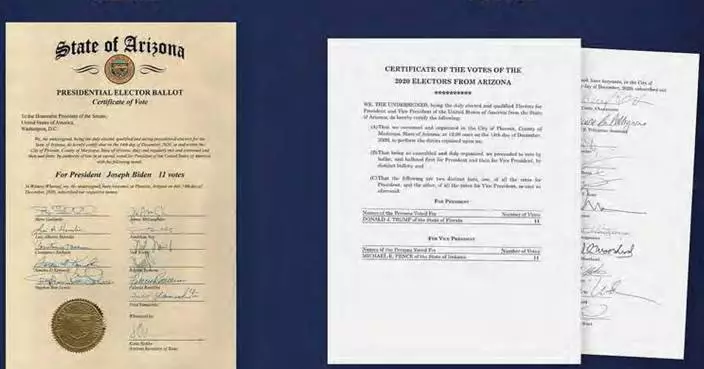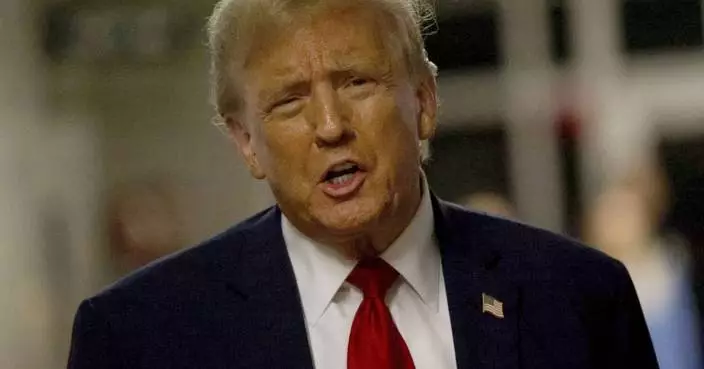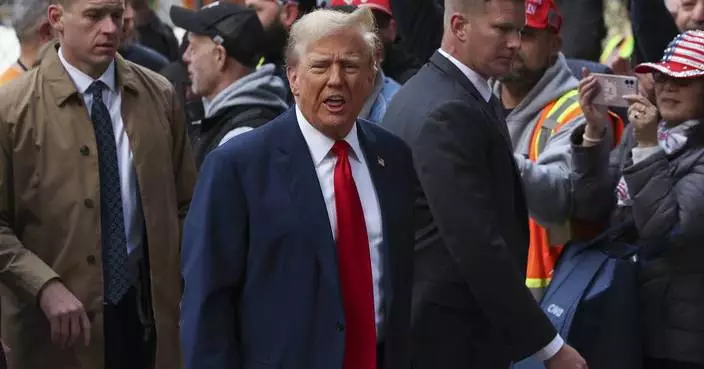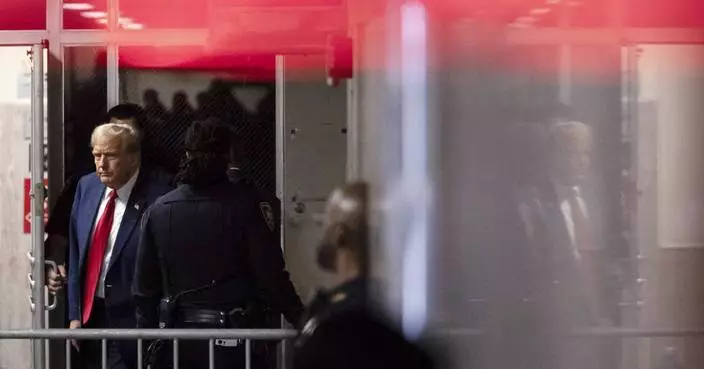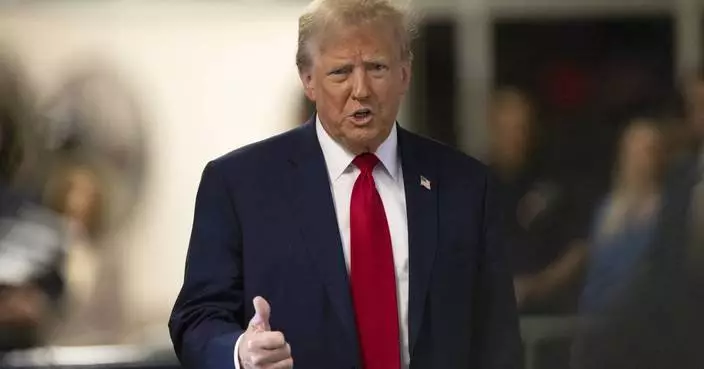"Everybody plays games," President Donald Trump declared Friday as he suggested the potentially historic North Korean summit he had suddenly called off might be getting back on track.
His sights set on a meeting that has raised hopes for a halt in North Korea's nuclear weapons development, Trump welcomed the North's conciliatory response to his Thursday letter withdrawing from the Singapore summit with Kim Jong Un. Rekindling hopes as quickly as he had doused them, Trump said it was even possible the meeting could take place on the originally planned June 12 date.
"They very much want to do it; we'd like to do it," he said.
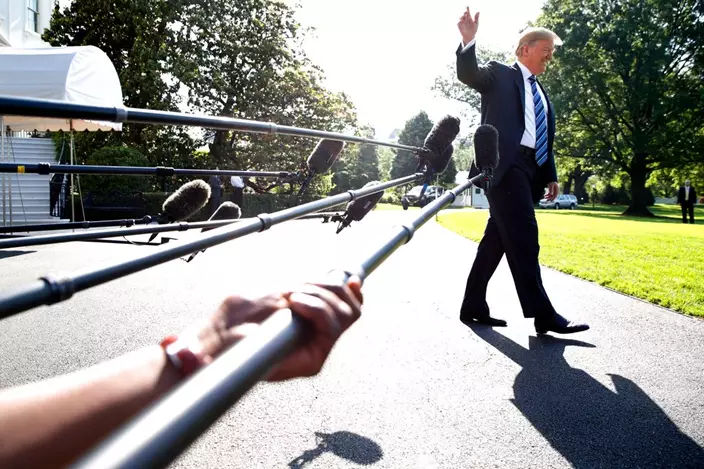
President Donald Trump waves while walking away after speaking to the media, as he walks to the Marine One helicopter Friday, May 25, 2018, on the South Lawn of the White House in Washington. Trump is traveling to Annapolis to address the U.S. Naval Academy graduation ceremonies. (AP Photo/Jacquelyn Martin)
Later Friday, Trump tweeted that the two countries were "having very productive talks." He wrote that the summit, "if it does happen, will likely remain in Singapore on the same date."
The sweetening tone was just the latest change in a roller-coaster game of brinkmanship — talks about talks with two unpredictable world leaders trading threats and blandishments. On Thursday, White House officials had noted that Trump had left the door open with a letter to Kim that blamed "tremendous anger and open hostility" by Pyongyang but also urged Kim to call him.
By Friday, North Korea issued a statement saying it was still "willing to give the U.S. time and opportunities" to reconsider talks "at any time, at any format." Trump rapidly tweeted that the statement was "very good news" and told reporters that "we're talking to them now."
Confident in his negotiating skills, Trump views the meeting as a legacy-defining opportunity and has relished the press attention and the speculation about a possible Nobel Peace Prize. He made a quick decision to accept the sit-down in March, over the concerns of many top aides, and has remained committed, even amid rising concerns about the challenges he faces in scoring a positive agreement.
Asked Friday if the North Koreans were playing games with their communications, Trump responded: "Everybody plays games. You know that better than anybody."
While the president did not detail the nature of the new U.S. communication with the North on Friday, Defense Secretary Jim Mattis said at the Pentagon, "The diplomats are still at work on the summit, possibility of a summit, so that is very good news." He characterized the recent back-and-forth as the "usual give and take."
A previously planned trip by White House aides to Singapore this weekend to work on logistics for the trip remained on schedule, said two White House officials, who were not authorized to speak publicly.
Secretary of State Mike Pompeo spoke Friday with a top official from South Korea, whose leaders had appeared to be taken aback when Trump withdrew from the summit. Spokeswoman Heather Nauert said Pompeo and South Korean Foreign Minister Kang Kyung-wha reaffirmed their "shared commitment to the denuclearization of the Korean peninsula" and pledged to coordinate "in all of their efforts to create conditions for dialogue with North Korea."
South Korea's government said in a statement released Saturday that it was relieved about the revived talks for a summit.
The U.S. and North Korea do not have formal diplomatic relations, complicating the task of communicating between the two governments. Under the Trump administration, the CIA, where Pompeo served as director before becoming secretary of state, has taken an unusually prominent role in back-channel negotiations.
Pompeo last year assembled a working group at the CIA called the Korea Mission Center, which gradually assumed the lead role in talks with the North Koreans, and the group's director, a retired senior CIA official with deep experience in the region, became the main U.S. interlocutor with Pyongyang.
The group did not supplant the State Department's traditional mode of communication with the North, which is known as the "New York Channel" and involves U.S. diplomats and their North Korean counterparts posted to the United Nations. But it did play the major role in organizing Pompeo's two trips to Pyongyang, once as CIA director and once as secretary of state.
Trump's comments Friday came after days of mixed messages on the summit.
Trump, in his letter to Kim on Thursday, objected specifically to a statement from a top North Korean Foreign Ministry official. That statement referred to Vice President Mike Pence as a "political dummy" for his comments on the North and said it was up to the Americans whether they would "meet us at a meeting room or encounter us at nuclear-to-nuclear showdown."
Trump then said from the White House that a "maximum pressure campaign" of economic sanctions and diplomatic isolation would continue against North Korea — with which the U.S. is technically still at war — though he added that it was possible the summit could still take place at some point.
A senior White House official said the North had reneged on its promises ahead of the summit, including a pledge to allow international inspectors to monitor its explosive destruction of its nuclear test site. The official spoke on the condition of anonymity to avoid overshadowing Trump's comments Thursday.
Trump's aides had warned that merely agreeing to the summit had provided Kim with long-sought international legitimacy and, if Trump ultimately backed out, he risked fostering the perception that the president was insufficiently committed to diplomatic solutions to the nuclear question.
U.S. defense and intelligence officials have repeatedly assessed the North to be on the threshold of having the capability to strike anywhere in the continental U.S. with a nuclear-tipped missile — a capacity that Trump and other U.S. officials have said they would not tolerate.
Russian President Vladimir Putin chimed in from St. Petersburg, saying that "if you don't behave aggressively and if you don't corner North Korea, the result that we need will be achieved faster than many would think, and at less cost."
Trump, speaking Friday to graduates at the U.S. Naval Academy, did not mention North Korea directly, but he stressed the United States' military might.
He said, "The best way to prevent war is to be fully prepared for war."
NEW YORK (AP) — Rooting for Donald Trump to fail has rarely been this profitable.
Just ask a hardy band of mostly amateur Wall Street investors who have collectively made tens of millions of dollars over the past month by betting that the stock price of his social media business — Truth Social — will keep dropping despite massive buying by Trump loyalists and wild swings that often mirror the candidate’s latest polls, court trials and outbursts on Trump Social itself.
Several of these investors interviewed by The Associated Press say their bearish gambles using “put” options and other trading tools are driven less by their personal feelings about the former president (most don’t like him) than their faith in the woeful underlying financials of a company that made less money last year than the average Wendy’s hamburger franchise.
“This company makes no money. ... It makes no sense," said Boise, Idaho, ad executive Elle Stange, who estimates she’s made $1,300 betting against Trump Media & Technology stock. “He's not as great a businessman as he thinks. A lot of his businesses go belly up, quickly.”
Says Seattle IT security specialist Jeff Cheung, “This is guaranteed to go to zero.”
As of Friday morning, a month since Trump Media’s initial public offering sent its stock to $66.22, it has plunged to $38.49. An AP analysis of data from research firms FactSet and S3 Partners shows that investors using puts and “short selling” have paper profits so far of at least $200 million, not including the costs of puts, which vary from trade to trade.
Still, amateur traders, mostly risking no more than a few thousand dollars each, say the stock is too volatile to declare victory yet. So they are cashing in a bit now, letting other bets ride and stealing a glance at the latest stock movements in the office cubicle, at the kitchen table or even on the toilet.
There have been plenty of scary moments, including last week when DJT, the ex-president’s initials and stock ticker, jumped nearly 40% in two days.
“I don’t know which direction the stock is going,” says Schenectady, N.Y., day trader Richard Persaud while checking his iPhone amid the surge. “It’s so unbelievably overvalued.”
Many who spoke to the AP say knowing their bets have helped slash the value of Trump’s 65% stake in half is an added political benefit. If some of their predictions are right, they may able to someday push it to zero, making it impossible for him to tap it to pay his hefty legal bills or finance his GOP presidential campaign.
They have a long way to go. Trump’s stake is still worth $4 billion.
Normally, investors betting a stock will fall, especially a gutsy breed of hedge fund traders called “short sellers,” will do plenty of homework. They’ll pore over financial statements, develop expertise in an industry, talk to competitors, and even turn to “forensic accountants” to find hidden weaknesses in the books.
No need in Trump Media’s case. It’s all there in the Sarasota, Florida-based company's 100-page financial report: A firehose of losses, $58 million last year, on minuscule revenue of $4 million from advertising and other sources.
The losses are so big, as Trump Media’s auditor wrote in the report, they “raise substantial doubt about its ability to continue as a going concern.”
A short seller’s dream? Or is it a nightmare?
Amateur trader Manny Marotta has two computer screens at home, one for work, the other showing DJT stock's movements where he can gauge how much he’s up or down.
It wasn’t looking so good earlier this week.
The legal writer from suburban Cleveland had been up about $4,000 on “put” options purchased over the past few weeks. But the screen that morning was showing investors, presumably rich ones, buying large volumes of DJT shares, pushing up the stock once again.
“My options are worth less with every passing minute,” says Marotta, adding about DJT: “It’s being manipulated. It’s insane.”
Waiting for the stock to drop is especially painful to “short sellers,” who pay a fee to borrow shares owned by others. The idea is to quickly sell them on a hunch then they will be able to buy the same number of them later for much cheaper before having to return them to the lender. That allows short sellers to pocket the difference, minus the fee, which is usually nominal.
In DJT’s case, the fee is anything but nominal.
It was costing 565% a year at one point earlier this month, meaning short sellers had only two months before any possible profits would be eaten up in fees, even if the stock went to zero. It’s a rate so off the charts, that only three other stocks in recent memory have exceeded it, according to data from Boston University’s Karl Diether and Wharton’s Itamar Drechsler, who have studied short selling back two decades.
Add in massive buying by Trump supporters who see it as a way to support their candidate, and losses could multiply fast.
“It’s scary,” says Drechsler, who likens buyers of Trump’s stock to unwavering sports fans. “It is everything that you hope that the stock market is not.”
Trump Media spokeswoman Shannon Devine said the company is in a “strong financial position” with $200 million in cash and no debt, and said the AP was “selecting admitted Trump antagonists.”
Another danger to the stock is a “short squeeze.” If the price rises sharply, it could set off a rush by short sellers who fear they’ve bet wrongly to return their borrowed shares right away and limit their losses. And so they start buying shares to replace the ones they borrowed and sold, and that very buying tends to work against them, sending the price higher, which in turn scares other short sellers, who then also buy, setting off a vicious cycle of price hikes.
“If DJT starts rallying, you’re going to see the mother of all squeezes,” says S3 Partners short-selling expert Ihor Dusaniwsky, who spent three decades at Morgan Stanley helping investors borrow shares. “This is not for the faint of heart.”
And if that wasn’t enough, there is a final oddball feature of DJT stock that could trigger an explosion in prices, up or down.
“Lock up” agreements prohibit Trump and other DJT executives from selling their shares until September. That leaves the float, or the number of shares that can be traded each day by others, at a dangerously tiny 29% of total shares that will someday flood the market. That means a big purchase or sale on any day that would barely move a typical stock can send DJT flying or crashing.
The float is smaller than that of most other notoriously volatile stocks. At their smallest levels, AMC, GameStock and Shake Shack each had more than double the float.
Seattle trader Cheung sees DJT’s freak characteristics as a reason to bet against the stock, not shy away. When the lock-up period ends, he predicts, the ex-president will indeed sell his shares, spooking the market and sending the price down sharply. And even if he doesn’t, other insiders whose lock-ups expire will fear he will do so and will move fast to get a good price before it falls.
“The first one to sell out is going make to most, ” Cheung says. “Everyone is going to sell.”
Still, he doesn’t want to lose money in the interim, so Cheung is offsetting some of his “put” bets with the purchase of “calls.” The latter are also derivatives, but they do the opposite, paying off when the stock rises. Cheung hopes that whichever makes money, the puts or the calls, he will make enough with one to more than make up for the loss of the other.
If all of this seems too complicated, there is a far simpler way to make money betting against Trump.
Offshore, casino-style betting sites are taking wagers on the 2024 election, and some have even made President Joe Biden the favorite.
Contact AP’s global investigative team at Investigative@ap.org or https://www.ap.org/tips/
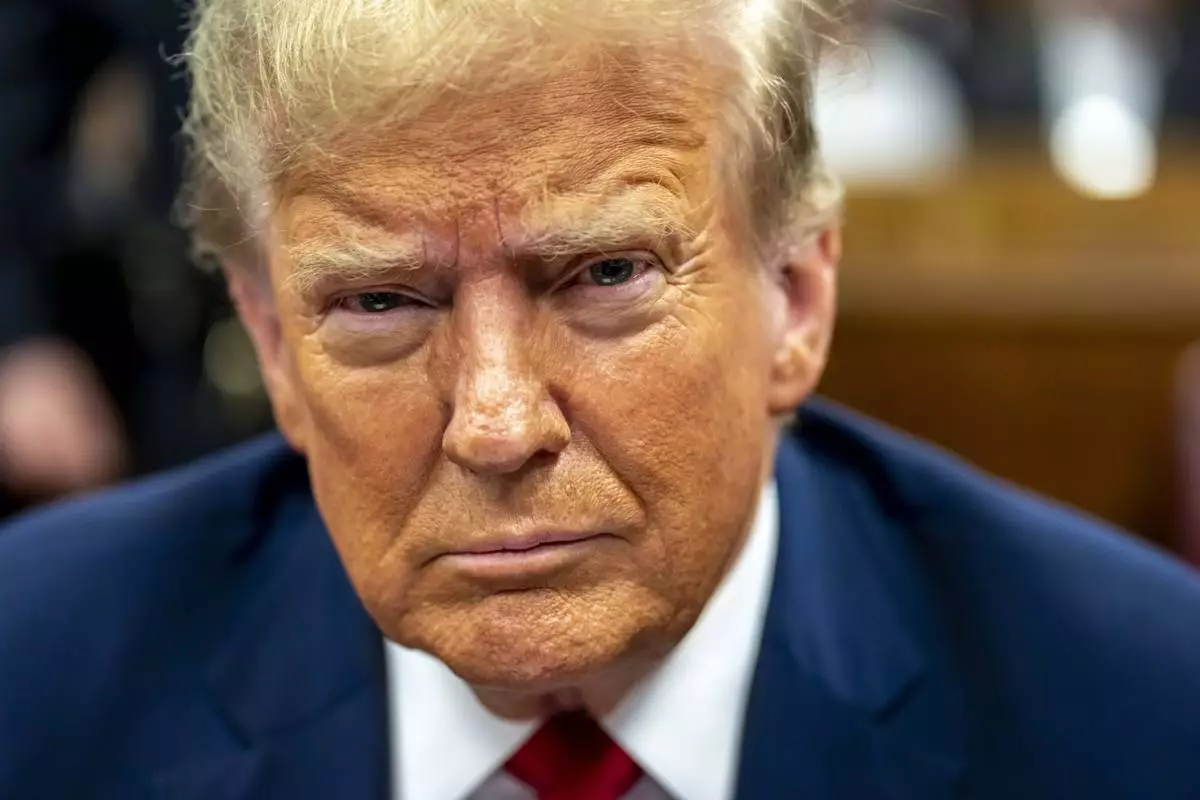
Former President Donald Trump sits in a courtroom in Manhattan criminal court, before the start of his trial on Thursday, April 25, 2024, in New York. (Mark Peterson/Pool Photo via AP)
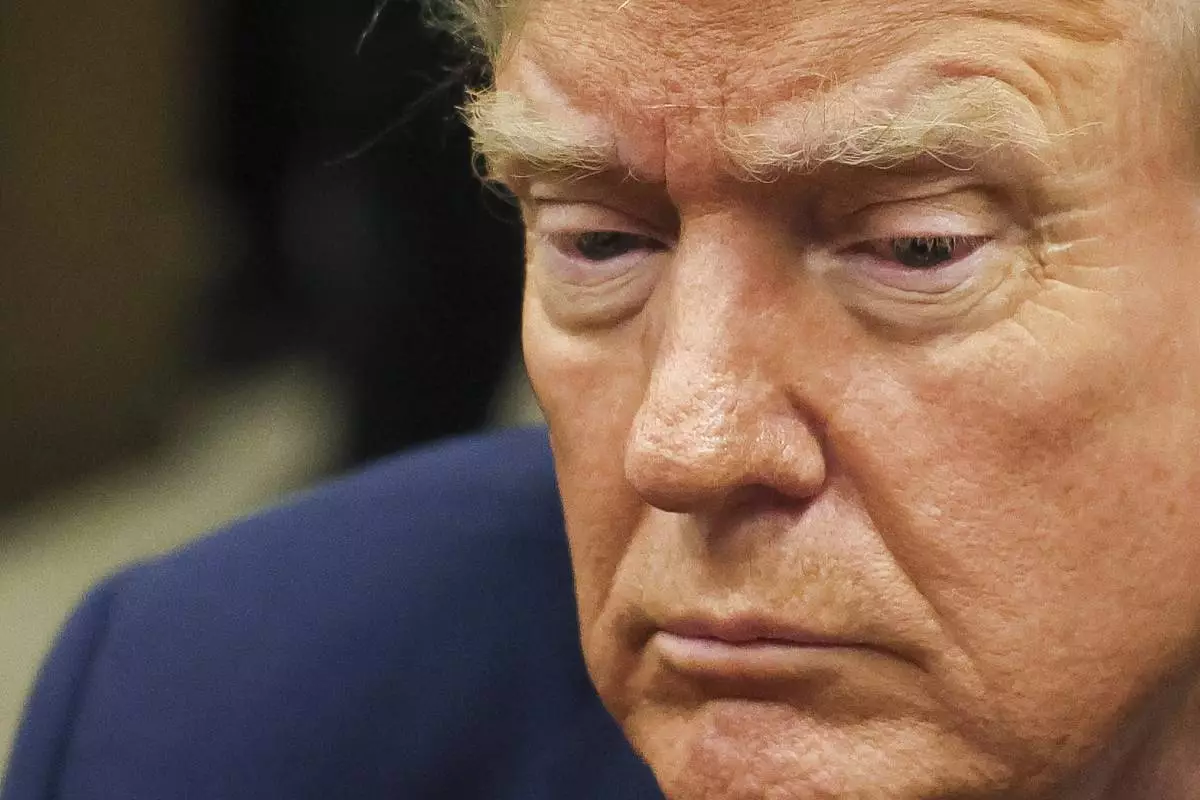
Republican presidential candidate and former President Donald Trump sits in Manhattan state court in New York, Monday, April 23, 2024. (Brendan McDermid/Pool Photo via AP)
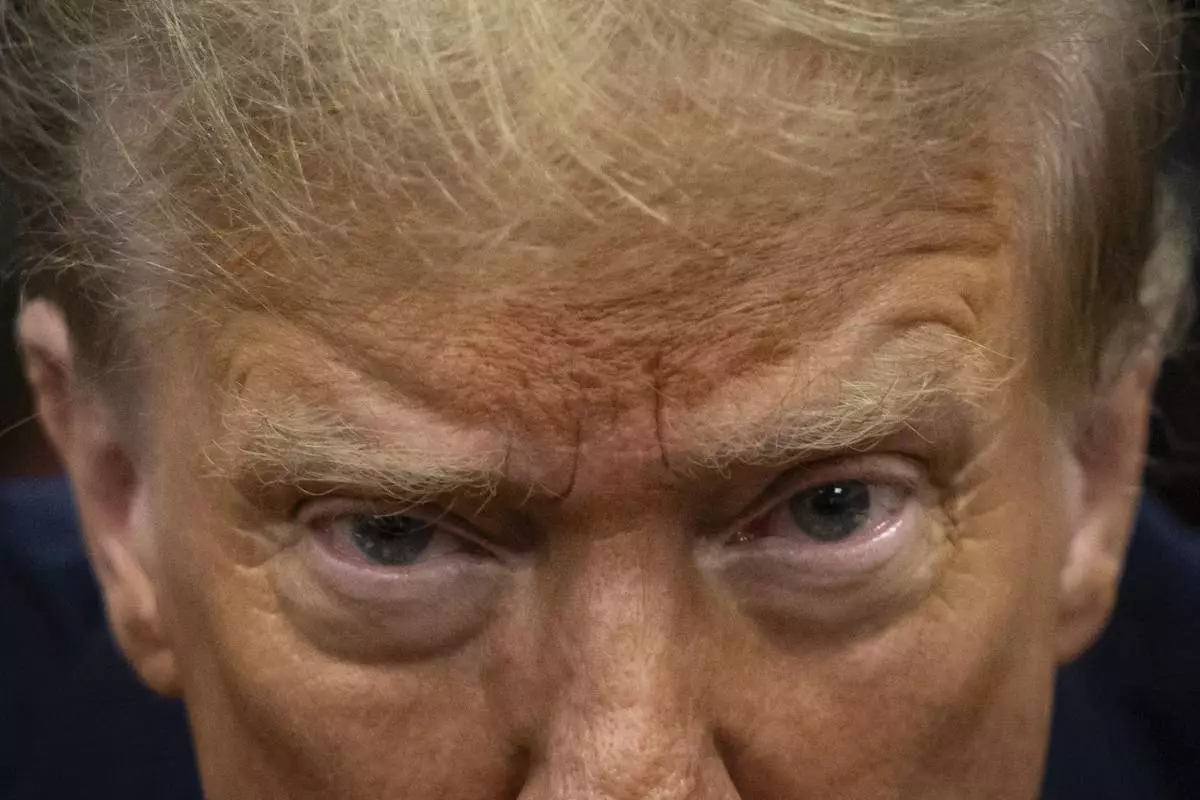
Former President Donald Trump waits for the start of proceedings in Manhattan criminal court, Tuesday, April 23, 2024, in New York. (AP Photo/Yuki Iwamura, Pool)







